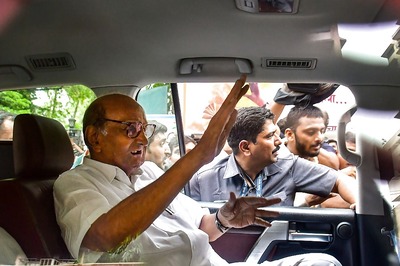
views
Learning the Law

Check your state’s laws. A wedding officiant is fulfilling the legal duty of certifying a marriage license so it’s important to understand the law in your state. Visit your state’s Secretary of State website to see which laws apply. Some states are very lenient with who can become an officiant, but others require officiants to be a practicing minister with a congregation. Some states will impose a fine for any marriages officiated illegally.

Visit or call your local office that issues marriage licenses. This can be a county clerk, probate court, or town hall. Some counties within a state have different requirements for wedding officiants than others, so it’s a good idea to find out what your county laws are as well.

Read through your state’s marriage license. As the officiant of a wedding, it is your job to ensure the people getting married understand what the marriage license means. Thoroughly read through the marriage license and make sure you understand it enough to explain what it means.
Becoming Ordained

Pick a religious organization to get ordained through. Being ordained means to be appointed as a member of clergy in a religious organization. This makes a person an official representative of the religious organization. Becoming ordained through a religious organization is an important part of becoming a wedding officiant, and it’s required by law in many states. If you are not previously affiliated with a religion, there are many non-denominational or interfaith organizations to choose from. Many religious organizations will ordain you online, and some will even do it free online. Make sure your state will recognize online ordinations before you choose this route. Some jurisdictions will not recognize ordinations through certain religious organizations so check your local laws to ensure your ordination will be recognized. If you want to perform weddings in multiple states, you may have to get ordained from several different organizations depending on the local laws in each state.

Take the steps to become ordained. Once you’ve picked the religious organization you want to be ordained through, you need to do the organization’s specific steps to become ordained. Sometimes it’s as easy as filling out a form online, but with others you may have to take a few classes or pay a small fee.

Check periodically to make sure you’re still ordained. Many religious organizations only require you to complete the initial process to become ordained and you’re ordained for life, but some require you to periodically update your information. Check to see if the religious organization you chose requires any updating, and if it does, keep up to date with it so you don’t end up performing any illegal ceremonies.
Performing the Ceremony

Meet with the couple getting married. The first thing to do to officiate a wedding is to sit down with the couple and find out what kind of ceremony they want. You should plan out the ceremony with the couple so that everyone is on the same page. Does the couple want a long, traditional ceremony with readings from a religious text? Would the couple rather have a secular ceremony without any religious elements? Are there people the couple wants to include in the ceremony to sing songs, give readings, or participate in any way?

Learn about the couple. As the officiant you’ll be giving a short speech as an introduction and speaking throughout the ceremony to keep it flowing smoothly. Talk to the couple and find out information about them to use in the ceremony. Find out how the two people met. Learn what their favorite activities are and what their profession is. See if there are any fun jokes between them, or if they share a unique experience. EXPERT TIP Minoti Mehta Minoti Mehta Event & Wedding Planner Minoti Mehta is the Founder of Vermilion Weddings & Events, an event and wedding planning business based in San Francisco, California. Minoti grew up in the event and wedding planning space and has over five years of event planning experience. She has been invited to participate as a Delegate at five exclusive Event Planner Conferences including Destination Wedding Planners Congress and Planners Xtraordinaire and has become known as one of the Top Wedding and Event Planners in the San Francisco Bay Area. Minoti's work has been featured on NDTV India, Love Stories TV, Maharani Weddings, and WedWise India. Vermilion Weddings & Events was also awarded WeddingWire's Couple's Choice Award in 2018. Minoti has a BS in Hospitality Management and Accounting from the University of San Francisco. Minoti Mehta Minoti Mehta Event & Wedding Planner Our Expert Agrees: It's important for married couples and vendors to be on the same page, so as an officiant, take the time to get to know them. For instance, you might ask if they're spiritual, and whether they'd prefer their service to be more religious or less religious.

Practice the ceremony. On the day of the ceremony, you will be performing it in front of an audience, so it’s a good idea to practice it before the wedding day to make sure things run smoothly. You should write out the ceremony to practice on your own what you’ll be saying, and you should also hold a rehearsal with everyone involved with the ceremony to walk through it unofficially one time. The rehearsal is usually held at the site of the wedding.
Creating a Business

Name your business and register it. To make a business officiating weddings, you’ll need to name your business and register it with either your county clerk’s office or your state’s government depending on your state. Your business will be registered as your personal name unless you create a trade or DBA, doing business as, name when you register. Many people like to use their personal name as part of their business name. For example, you can name your business John Walker’s Wedding Services or Amy’s Wedding Officiants.

Decide what your fee will be. Most wedding officiants charge by the hour for their services, but some will have an upcharge if they have to travel a long way for the ceremony. Typically wedding officiants charge between $50 to $100 per hour for their services depending on where they are working. Typically a wedding officiant will earn around $300 to $400 per wedding. Officiants in bigger cities like New York can charge more than officiants in a small rural town.

Collaborate with other professionals. One way to gain customers is to collaborate with other wedding professionals so you can market a one stop shop for weddings. Find a photographer, videographer, florist, and possibly even a caterer to associate with, and offer couples an easy way to book many aspects of the wedding all at once. When you collaborate with other professionals, you gain the added benefit of all marketing your services together on everyone’s websites giving each person more exposure.

Market your services. One great way to market your services as a wedding officiant is to create a website. Most couples will use the internet to search for wedding professionals to contract with, so you want to make sure you have a site for them to find. You can easily build a website by purchasing a domain name and finding a website host that has a template builder. There are also other ways to advertise your new business. Print business cards with your business name, phone number, and website on them to hand out to people. Keep several business cards on hand at all times because you never know when you’ll run into someone looking for a wedding officiant. Add your business name to wedding databases. Get a booth at a wedding trade show to hand out your business card and pamphlets about your services. Make sure you have a fun giveaway for the trade show visitors so they’ll remember you. Contact wedding venues or wedding planning companies to see if you can keep flyers there or be promoted by them.




















Comments
0 comment